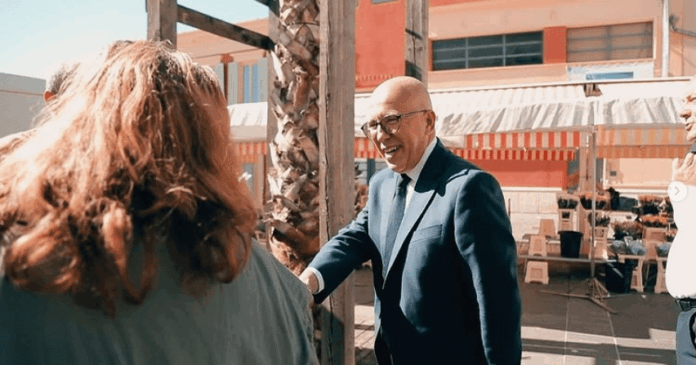A union of the right. That’s what the deputy and candidate for the mayor of Nice in 2026, Eric Ciotti, proposes. In a letter sent this Saturday, October 18, to the members of his former party, he invites the Republicans’ supporters to join the Union of the Right for the Republic (UDR), a party he founded in June 2024.
Éric Ciotti turns a new page in his political career. In a long letter addressed to the Republicans’ members, the president of the Union of the Right for the Republic (UDR) addresses those he still calls his “companions” and his “friends.” “Our country is experiencing a historic crisis—security, migration, economic, and institutional,” he writes initially. An introduction that sets the tone for a text both combative and imbued with disillusionment. According to him, “France and the French people have never needed a strong, clear, and courageous right as much as they do now.”
The political context fuels his speech. This Thursday, October 16, the most recent government of Sébastien Lecornu narrowly escaped a vote of no confidence. Eighteen votes were missing for it to pass. For Éric Ciotti, these eighteen votes symbolize the moral defeat of his former party. “Eighteen votes that the Republicans did not have the courage to grant French resurgence,” he denounces. “The supporters have been betrayed, the voters deceived.”
He directly questions the path taken by Laurent Wauquiez and the LR parliamentarians. “The group of LR deputies led by Laurent Wauquiez refused to vote for the censure,” he writes, condemning the internal divisions and “ego wars” that would have paralyzed the party. For the former president of the LR, this attitude led to an “additional betrayal,” confirming for him the necessity of his departure. “I broke the wall of political correctness,” he claims in his letter.
The union of the right as a horizon
Éric Ciotti claims the creation of the Union of the Right for the Republic in June 2024 as the logical continuation of his political commitment. “Disgusted by the cowardice of LR’s decorated hats and convinced that an alliance of the right was the only way for our ideas to gain power, I founded the UDR, heir to the great Gaullist family,” the letter reads.
The former leader of the Republicans asserts that he acts “with complete independence,” but claims his alliance with the National Rally. “I built an alliance with the National Rally. I founded the UDR, Union of the Right for the Republic, heir to the great Gaullist family.” According to him, this strategy is now imperative as the only capable of “reviving the country, restoring order, and defending our identity.”
His speech targets disappointed Republican members, whom he accuses of having “bowed down to power and the left.” He insists: “our renaissance will not come from those who bow down to power and the left. It will come from those who have never betrayed their convictions. It will come from the union of the right, from the great alternation.”
This union is at the heart of his strategy. For him, it must go beyond old divisions and unite the forces of the right around a common project. He calls on the militants to “no longer be ashamed to prefer the gathering of right-wing parties to the moral submission to the left’s diktat.”
An offensive toward LR members
Éric Ciotti’s letter is not just a political text; it is a call to rally. “Join the political family that LR should have become,” adds the one who is also a departmental councilor. The message directly targets the militant base of his former party.
The president of the UDR highlights the growth of his young formation: “we are already more than 20,000, and several hundred of you join us each day since the tragic events of recent weeks.”
A claim confirmed by several sources close to the party. According to Paris Match, about 4,000 former LR members have joined the UDR since the failure of the vote of no confidence. An influx facilitated by simplified procedures: for just one euro, an LR member can join the new party, compared to twenty euros for a classic membership. No proof of previous membership is required, only a simple declaration of honor suffices.
This momentum takes place in a context of deep crisis for the Republicans. The refusal to vote for censure has caused internal tensions and a new wave of departures. For many militants, the position defended by Éric Ciotti resonates as a clear alternative to a line deemed undecided.
By relying on the discourse of “the union of the right”, Éric Ciotti seeks to build a political block capable of competing with the presidential majority and the left. He refers to a militant base composed of “parliamentarians, mayors, departmental, and regional councilors,” who, according to him, “form a central force in political life capable of weighing on the nation’s destiny.”
A message of rupture and recomposition
Éric Ciotti’s letter marks a further step in the recomposition of the right. It seals a definitive break with his former formation and confirms his rapprochement with the National Rally. “The current situation proves me right,” adds the UDR candidate for the 2026 municipal elections in Nice. For him, the Republicans missed the turn that the French right should have taken: that of a broad alliance against the left and the center.
The deputy from the Alpes-Maritimes presents himself as the bearer of a recovery project. “This is why I call on you to join the UDR to rebuild the right,” he concludes. And he adds: “join, have your loved ones join, be the ambassadors of French renewal.”
The letter ends with a call for union and mobilization: “amplify the wave rising in the country.” Éric Ciotti signs off: “so that France remains France. On the right and in unity, join the UDR.”


